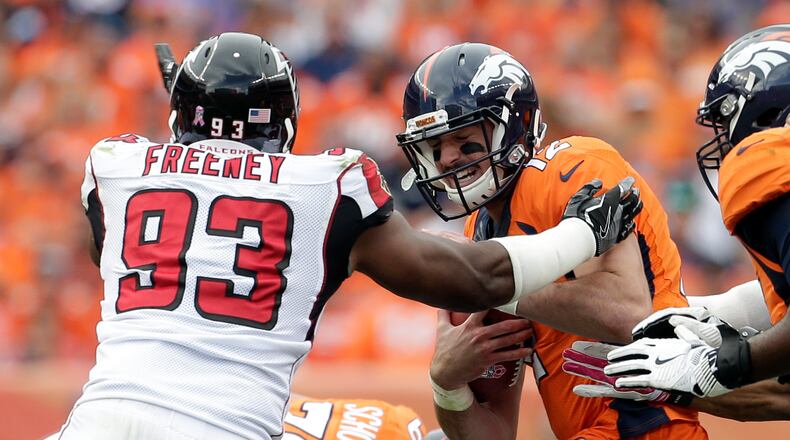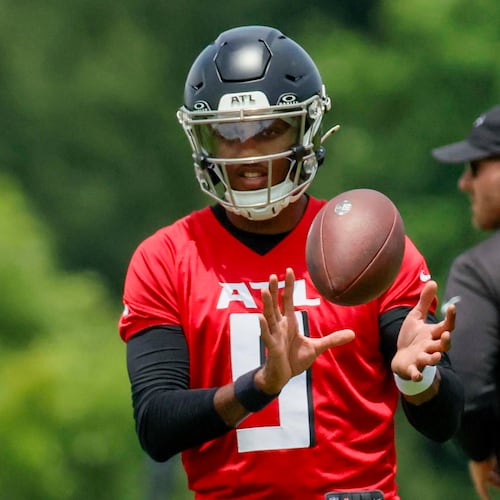It’s good to be kicking your heels up this weekend if you’re an NFL team, so long as your squad has qualified for the playoffs, such as the Falcons.
The bonus of having wild-card weekend off is nice. Usually.
The NFL instituted playoff byes for the top two teams in each conference in 1990, and in the 25 seasons since, the NFC beneficiaries have gone 41-9 in their initial playoff games, and those in the AFC have gone 33-17.
Even the Falcons know the joy. Four times they’ve had a first-round playoff bye, and they’re 3-1.
That puts them one click better than the league average. They’re 4-10 in playoff games when not coming off a postseason bye. None of this includes their 33-19 loss in Super Bowl XXXIII to the Broncos, where they had a bye and played at a neutral site (Miami).
Dan Quinn has an opinion.
When the Falcons’ head coach was defensive coordinator for the Seahawks as they won the Super Bowl after the 2013 season and just fell short in ’14, they had a bye each time.
“For me, it was everything. I imagine for guys who have the bye it’s a big difference from guys who don’t,” he said. “I’ve never experienced it the other way, but I would have not been comfortable doing that.”
Most teams, obviously, haven’t had a choice.
Discussion likely will never end on the topic of “Rest vs. Rust,” as fans like to talk about whether it’s better for weary players to heal or keep momentum going.
That assumes you have momentum.
And the Falcons have the mo. They won five of their past six games — all following their regular-season bye — losing only 29-28 on a very late and extremely rare two-point PAT interception return by Kansas City safety Eric Berry in a game where the visitors did most of their damage with special-teams scores.
The Chiefs, by the way, are an AFC bye team. The Falcons outscored the other five teams 192-94.
The offense is smoking; one of the more prolific in NFL history.
The defense, a sore spot last season, has improved significantly in the second half of the season, thanks in large measure to the remarkable emergence of second-year outside linebacker Vic Beasley Jr. and rookies De’Vondre Campbell, Deion Jones, Keanu Neal and undrafted free agent Brian Poole.
Wait. Never mind that momentum thing.
In 2012, Baltimore Ravens lost four of their last five regular-season games. Then, they went on to win the Super Bowl.
Falcons reserve linebacker Courtney Upshaw was there, a rookie with Baltimore. He couldn’t care less about a bye. He gets the conversation about rust vs. rest. He understands most consider a bye a bonus. But …
“My first year, against Indy (in a wild-card round game), Ray Lewis’ last home game and we just ran the table,” Upshaw said. “My next year, we had a wild-card game and ended up losing in the next round to the Patriots.”
Defensive end Dwight Freeney has gone both ways.
When he played for the Colts, they didn’t have a first-round bye after the 2006 season, but went on to beat the Bears in Super Bowl XLI.
They had a bye in ’09, when they were the No. 1 seed, beat the Ravens and Jets in home games, and then lost the Super Bowl to the Saints.
Last year, when he played for the Cardinals, they had a first-round playoff bye, won a home game and the got crushed in the NFC Championship game by the Panthers.
“From team-to-team … it’s how you want to prepare for it and train through it,” he said. “Some teams I’ve been on where it’s pretty much, ‘Put your feet up, guys, we need it.’ I think that just depends on that team and how healthy they are … It depends on the coach. I’ve had the first-round bye and lost, had the first-round bye and got to the Super Bowl.”
Actually, teams with first-round byes don’t lose often in their first playoff game. Those teams are 16-4 in the past four years.
New England has had a bye for five consecutive seasons, and the Patriots won their first playoff game each time. Every one of New England’s four Super Bowl titles came in a season where they had a first-round playoff bye.
All in all, the Falcons are probably enjoying this bye weekend rather than ruing it. Getting healthier is a good thing.
“I’m happy with the bye,” Neal said. “It allows guys who are dinged up to rest a little bit, get our bodies back.”
Playoff byes are a bigger deal than those in the regular season, as teams coming off a postseason bye always play at home, where they’ve won 74 percent since 1990. The home winning percentage for all playoff home teams was about 67 percent in that span, while in the regular season about 58 percent.
Yet, while rest may help the weary, it’s no guarantee.
Seven wild-card teams have won Super Bowl titles without any byes.
Two NFC franchises in these playoffs have history winning it all without byes. Green Bay in 2010 ran the table, and the Giants — who’ve won an NFL-record five consecutive road playoff games — in ’07 and ’11 did it as well.
Only twice in NFL history has neither the No. 1 or No. 2 seed advanced to the conference championship game. So, in all, it’s good to be in the Falcons’ position as the No. 2 seed. It’s no sure thing, however.
“I think some people would say yes, and some would say no,” Upshaw said about the whole bye thing. “My opinion you have to go out and execute no matter what, whether we were playing this weekend or next weekend, you’ve got to go out and do your job.”
About the Author
Keep Reading
The Latest
Featured



